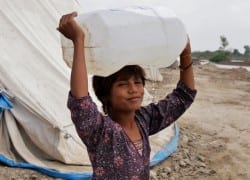Oxfam has expressed alarm over the floods in Sindh and Balochistan provinces, as only US$1.30 has been committed per person by international donors in the first 10 days of the UN appeal as opposed to US$3.20 committed in the same period during last year’s floods.
 |
| Oxfam supplies clean drinking water to people displaced by fthe latest flooding in Sindh, Pakistan. |
Oxfam has expressed alarm over the floods in Sindh and Balochistan provinces, as only US$1.30 has been committed per person by international donors in the first 10 days of the UN appeal as opposed to US$3.20 committed in the same period during last year’s floods.
Oxfam calls on the Government of Pakistan and the international donor community to dig deep into their resources and rapidly increase their funding to prevent the disaster from deteriorating further. The agency warns that the situation of millions of people will worsen unless more aid arrives.
According to the latest figures, more than 8.8 million people in Sindh and 14,000 people in Balochistan so far have been affected by the 2011 monsoon rains. The human impact of this disaster in terms of the number of people affected is more than the combined impact of the Haiti earthquake and the Pakistan earthquake of 2005. Reported losses are being estimated at US$215 million – that number is likely to increase as some areas are currently inaccessible and the impact of the floods cannot be assessed.
“This is a cruel repeat of last year. Again funding is too little and far too slow. Donors must recognise the gravity of the situation. Millions of innocent people, the majority of whom are women and children, are in desperate need of the basics: food, water, sanitation, healthcare and shelter. If assistance does not come quickly, then a second emergency of rising malnutrition and water-borne diseases risks making a public health disaster a reality. There is no time to waste. We must all act now,” said Neva Khan, Country Director of Oxfam in Pakistan.
Approximately 6.8 million acres of land have been damaged by the floods – an area nearly as large as Haiti.
According to the UN, the floods have wiped out 73 per cent of standing crops, 36 per cent of livestock and 67 per cent of food stocks in the 13 worst affected districts of Sindh. In a province where already 72 per cent of the population is acutely short of food, this loss of crops means hundreds of thousands more people don’t have enough to eat.
“Some of the most agriculturally productive districts have been hit this time. Sugar cane, chilli, cotton and rice crops have been damaged right before the harvest season. The women I met in some of the unofficial camps in Sanghar and Mirpurkhas districts of Sindh told me about the very difficult life choices they have to make everyday. Many are going without food in order to feed their children. No one should have to make such choices. It is time to truly show the women, men and children of Sindh that we are human and have compassion. This must be shown through our actions – now,” said Khan.
Approximately 97 per cent of the UN’s US$357 million appeal remains unfunded. So far only US$11.5 million has been committed by donors. This pales in comparison with the amounts committed to other crises. Within the first 10 days of the 2005 Pakistan earthquake, which left some 3.5 million people homeless, the international community had committed US$70 committed per person.
Likewise, 10 days after the Haiti quake the international community had pledged $495 per person.
“People are living in desperate conditions. Each passing day puts more people at risk of deadly diseases, forces more people into hunger and destroys more futures. We are in a battle against time. Donors, the UN, aid agencies and the government, need to step up their response immediately. People need help now,” said Khan.



